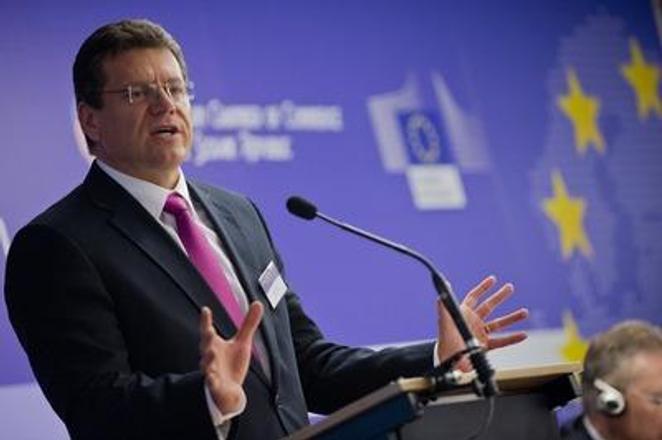“When I travel across the EU, from north to south, from east to west, from Bulgaria to Great Britain, from Malta to Denmark, I can say that this project has the support of all EU-member states, as well as everyone involved, meaning from national governments to parliaments, civil society and also individual organisations operating on energy markets,” said Šefčovič, as quoted by the TASR newswire.
One of the reasons for the Energy Union’s support is that it views the energy issue from a holistic perspective.
“We don’t look at energy from the traditionally narrow view, that is, how to produce energy, transfer it and consume it,” Šefčovič continued. “If we want to be successful in this project and to put energy on some new path, we have to set a holistic, comprehensive approach. We have to combine energy policy with our goals in the field of climate change. We have to look clearly into how we can lower the proportion of carbon in transport and in other sectors of the economy.”
Slovak President Andrej Kiska stressed that the Energy Union project cannot be achieved without solidarity.
“Let’s remind ourselves that the gas crisis of 2009 caused by the cutting off of gas supplies from Russia through Ukraine threatened Slovakia’s energy security,” Kiska said, as quoted by TASR. “Almost 800 Slovak businesses had to halt production, which caused losses worth more than €1 billion. If the crisis had lasted longer, its economic impacts would have been dramatic indeed.”
The president also praised the solidarity and support of EU institutions during the crisis. Thanks to this support, the Slovak government’s measures and also steps taken by companies responsible for the supply and transit of gas, Slovakia is now a more secure country.
In this respect, Šefčovič said that if no special circumstances appear with regard to natural gas supplies, the EU should get through the upcoming winter without significant problems. He confirmed that Ukraine has been filling its gas reservoirs more slowly than last year.
“By the end of October 2015 it was expected that there would be about 17 billion cubic metres of gas, but I have to examine the current exact numbers,” Šefčovič said, as quoted by TASR. “The reserves of gas in Ukrainian reservoirs are currently a bit smaller than in the past.”
It is very important for Ukraine to continue with reforms in the sphere of energy, Šefčovič continued, adding that “we’re cooperating with Ukraine to adopt laws that would be compatible with European legislation”.
“The reform process and consolidation in the energy and gas sector could help Ukraine to pave the way for further investment,” Šefčovič said, as quoted by TASR.
Regarding the current situation in Ukraine, Kiska said it is relevant to talk about solidarity.
“It’s the returning threat of cutting off natural gas supplies following what happened six years ago that was the motive and basis for the European Energy Union project,” the president added, as quoted by TASR. “And an important feature of this effort was help for Ukraine. By launching reverse flows of gas, Slovakia has significantly contributed to increasing its [Ukraine’s] energy security. We helped by a great amount to fulfil the agreed goals of EU policy in relation to the Energy Union project.”
He went on to say that “it’s for these reasons that we can't ignore the fact that Russian [gas utility] company Gazprom – in cooperation with a group of European firms – is preparing to carry out the Nord Stream 2 project, which may mean complete cutoffs of supplies of gas from Russia to Europe via Ukraine and Slovakia”.
“Several of our partners in the EU argue that it’s just a business project of private companies and shouldn’t be mixed with politics, but I’ve pointed out that this attitude is in deep conflict with interest in lowering dependence on Russian gas, it’s in opposition to our experience of how dramatic the impacts of abusing gas supplies as a tool to achieve political goals can be,” said Kiska, as quoted by TASR.



 European Commission Vice-president for the Energy Union Maroš Šefčovič (source: TASR)
European Commission Vice-president for the Energy Union Maroš Šefčovič (source: TASR)